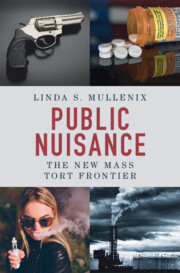Book contents
- Public Nuisance
- Public Nuisance
- Copyright page
- Dedication
- Contents
- Acknowledgements
- Introduction
- 1 Historical Context of Private and Public Nuisance at Law and Equity
- 2 Shifting Mass Tort Theories in the 1990s and the Judicial Resistance to the Expansion of Public Nuisance Liability
- 3 Expanding Public Nuisance Doctrine
- 4 Litigating Public Nuisance Claims
- 5 Expanding Public Nuisance Doctrine: Defenses
- 6 Expanding Public Nuisance
- 7 Environmental Contamination, PCBs, and Climate Change as Public Nuisance Harms
- 8 Opioids as Public Nuisance Health and Welfare Harm
- 9 Firearms Violence as a Public Nuisance
- 10 E-Cigarettes and Vaping as a Public Nuisance Harm
- 11 Evaluating the Competing Arguments Regarding the Contemporary Use of Public Nuisance in Mass Tort Litigation
- Conclusion
- Index
5 - Expanding Public Nuisance Doctrine: Defenses
Published online by Cambridge University Press: 02 November 2023
- Public Nuisance
- Public Nuisance
- Copyright page
- Dedication
- Contents
- Acknowledgements
- Introduction
- 1 Historical Context of Private and Public Nuisance at Law and Equity
- 2 Shifting Mass Tort Theories in the 1990s and the Judicial Resistance to the Expansion of Public Nuisance Liability
- 3 Expanding Public Nuisance Doctrine
- 4 Litigating Public Nuisance Claims
- 5 Expanding Public Nuisance Doctrine: Defenses
- 6 Expanding Public Nuisance
- 7 Environmental Contamination, PCBs, and Climate Change as Public Nuisance Harms
- 8 Opioids as Public Nuisance Health and Welfare Harm
- 9 Firearms Violence as a Public Nuisance
- 10 E-Cigarettes and Vaping as a Public Nuisance Harm
- 11 Evaluating the Competing Arguments Regarding the Contemporary Use of Public Nuisance in Mass Tort Litigation
- Conclusion
- Index
Summary
Chapter 5 turns to a description of the array of common law and statutory defenses that defendants who are sued for public nuisance claims have used in response to litigation. The chapter surveys several conventional tort defenses to public nuisance claims such as lack of causation, lack of proximate causation, failure to define an injury to a common public right, lack of unreasonable interference with a public right, remoteness, lack of standing, economic loss rule, municipal recovery rule, compliance with regulatory rules and standards, federal preemption, federal displacement, the learned intermediary, third party intervention, unconstitutional vagueness, statutes of limitation, violation of the dormant Commerce Clause, and the Eleventh Amendment. In addition, defendants have argued that individual claimants have failed to satisfy the special injury rule that might entitle them to compensatory damages. The chapter evalutes judicial discussion of these defenses and notes cases in which courts have found several defenses to be inapplicable, or overcome by the plaintiffs factual pleadings.
Keywords
- Type
- Chapter
- Information
- Public NuisanceThe New Mass Tort Frontier, pp. 90 - 113Publisher: Cambridge University PressPrint publication year: 2023

